Personas
Personas
Clustering Students to Build Personas
Customer segmentation
Personas are created using K-means clustering, an unsupervised machine learning algorithm, which clusters college students based on their responses across 36 Likert scale fields in the online survey. Clusters are visualized using Principal Component Analysis (PCA), where the principal component loadings on the X and Y axes represent the weights of the original Likert scale fields, transformed into the principal components that capture the most variance.
The Likert scale is a psychometric scale developed by Rensis Likert already in the 1930s, and it’s commonly used to this day in questionnaires to measure respondents’ attitudes, opinions, and perceptions (Sullivan & Artino, 2013). K-Means, K-Modes, and K-Prototypes are unsupervised machine learning algorithms, used for finding patterns in the data. Here I’ve opted to use K-Means and Principal Component Analysis (PCA), which is used to convert data to lower dimension space (this is a simpler predecessor of embeddings used in large-language models).
| Persona | Color/marker | Rough attitude signal along PC 1 | Cluster Centre (PC 1, PC 2) | Size |
|---|---|---|---|---|
| 1. Eco-Friendly | blue ★ | Leans pro-environment, willing to pay or act for green goals | (~ +2.2, +0.7) | n = 278 |
| 2. Moderate | orange ★ | Sits in the middle, balanced or undecided on most trade-offs | (~ 0.0, –1.5) | n = 356 |
| 3. Frugal | green ★ | Cost-first, cautious about spending for eco causes | (~ –2.0, +0.8) | n = 242 |
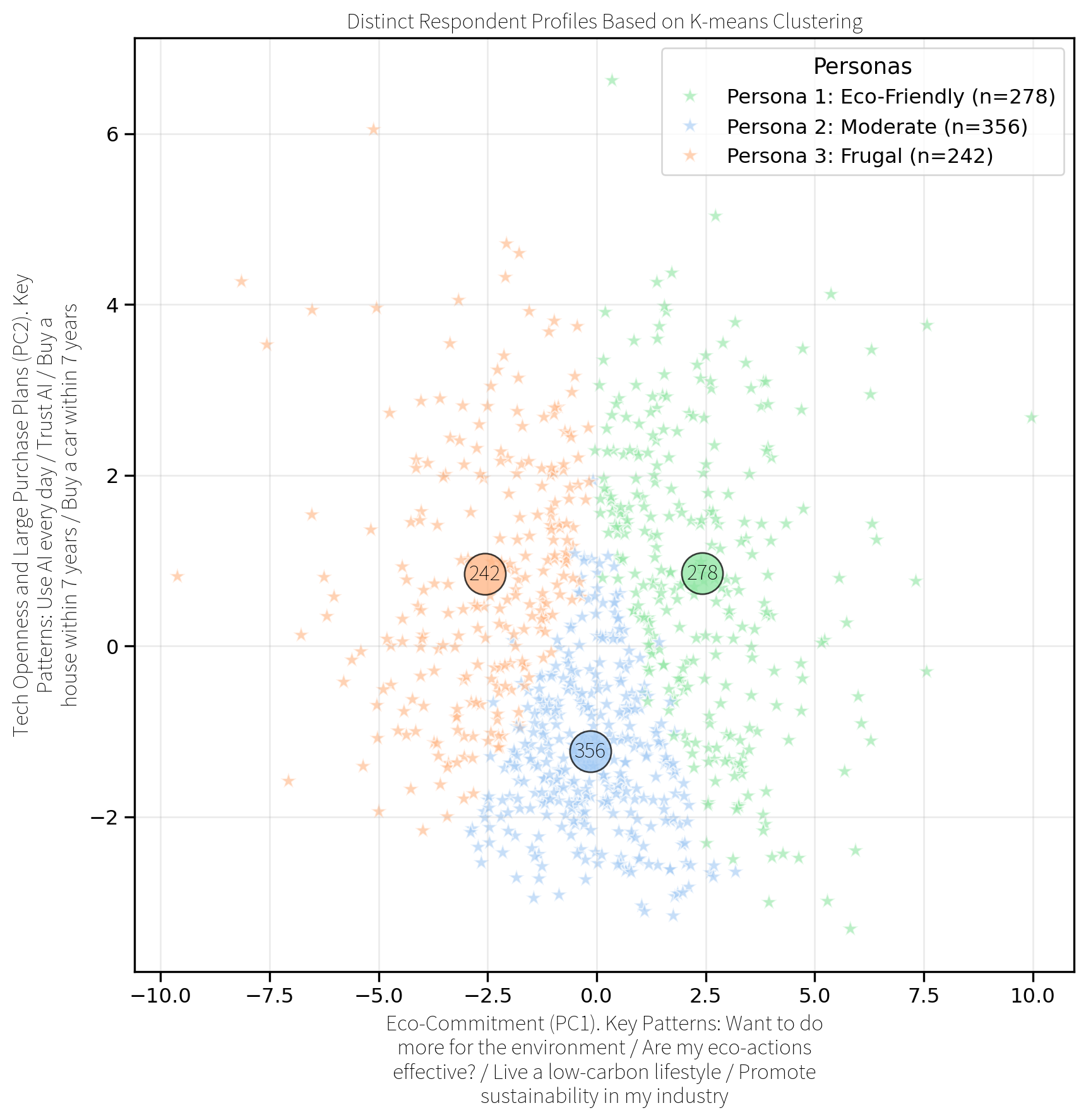
Figure 1: College Student Personas
Persona 1: “Eco-Friendly”
Questions Most Affecting Persona Creation include…
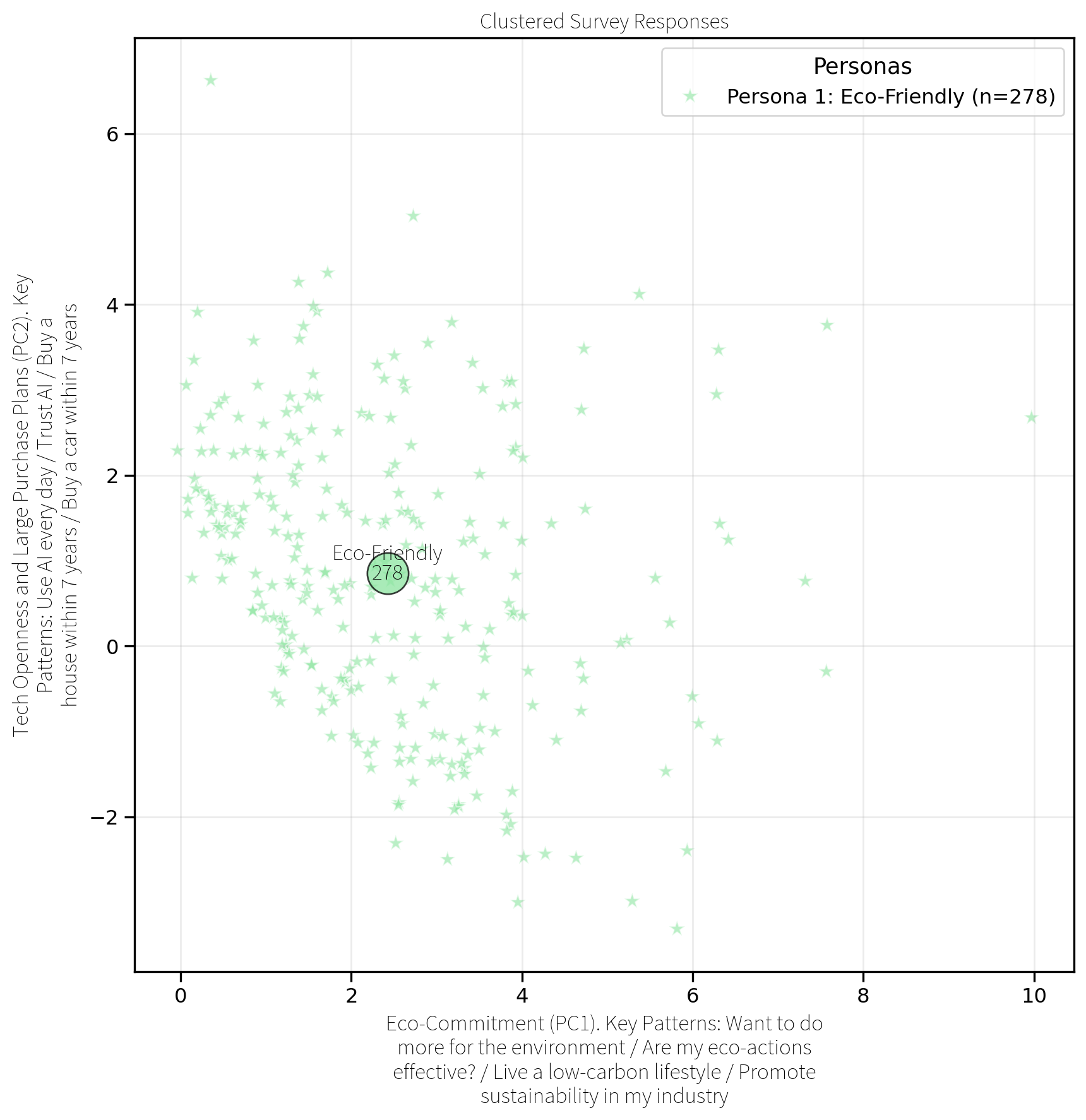
(a) Persona 1 - Eco-Friendly
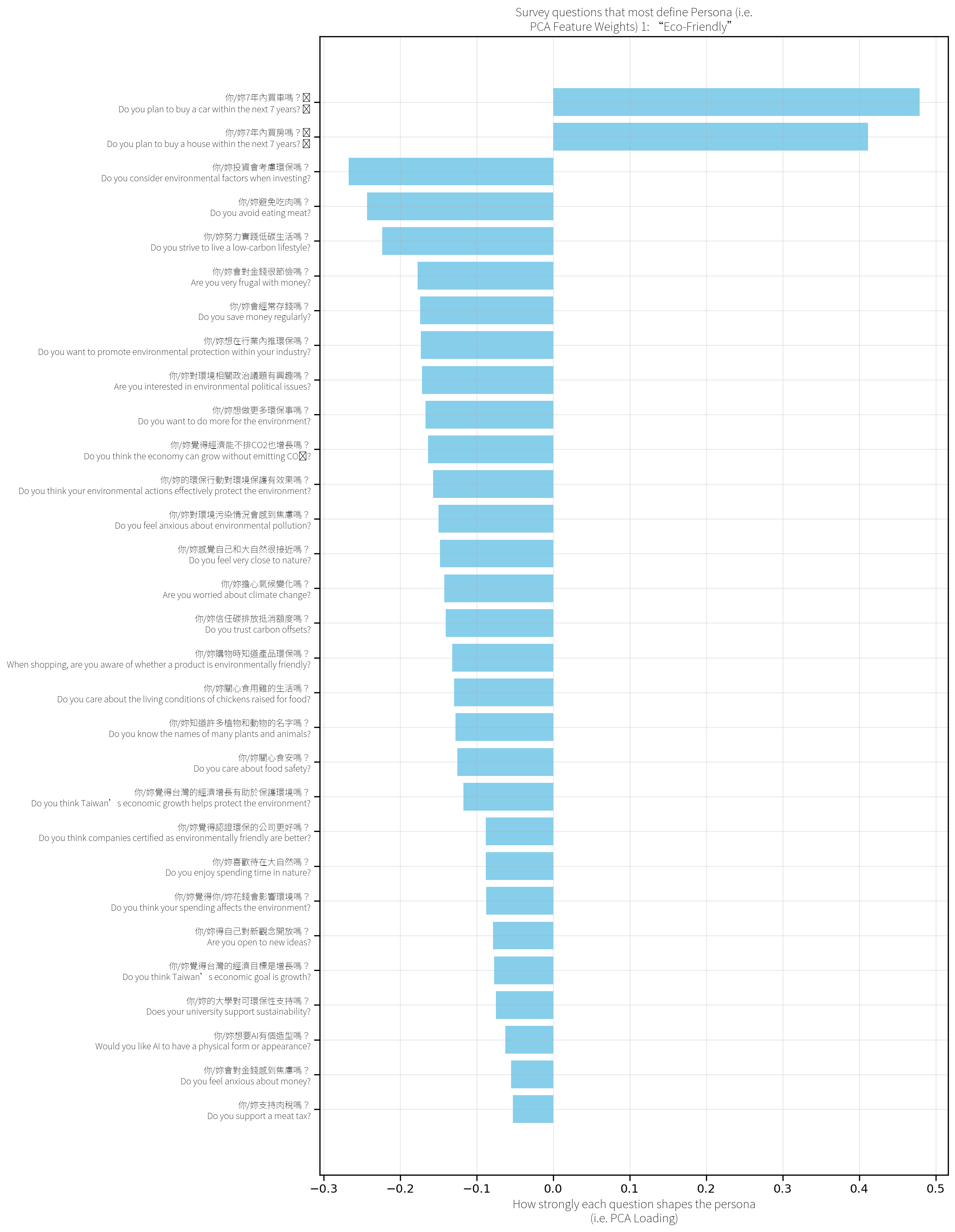
(b)
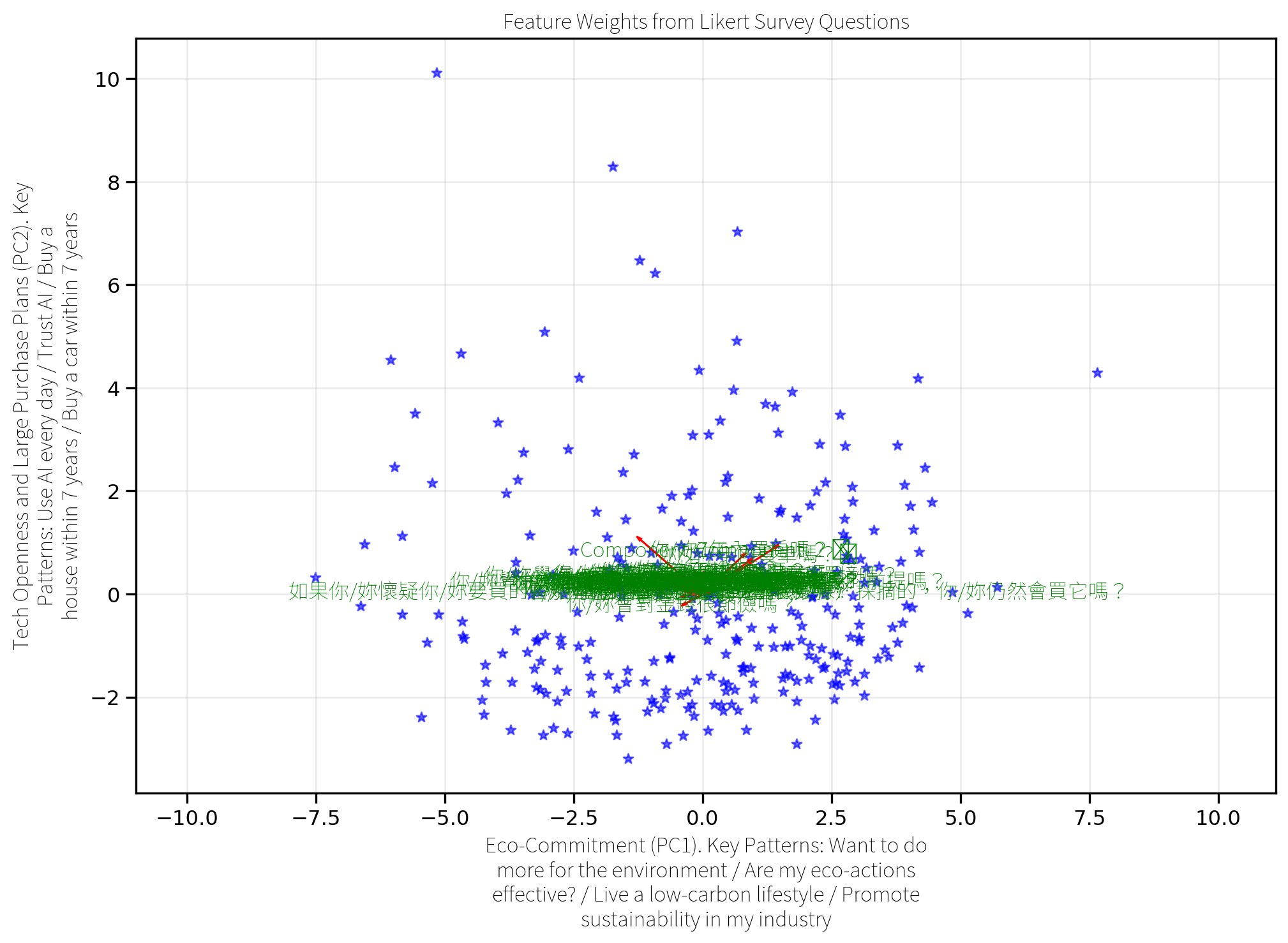
(c)
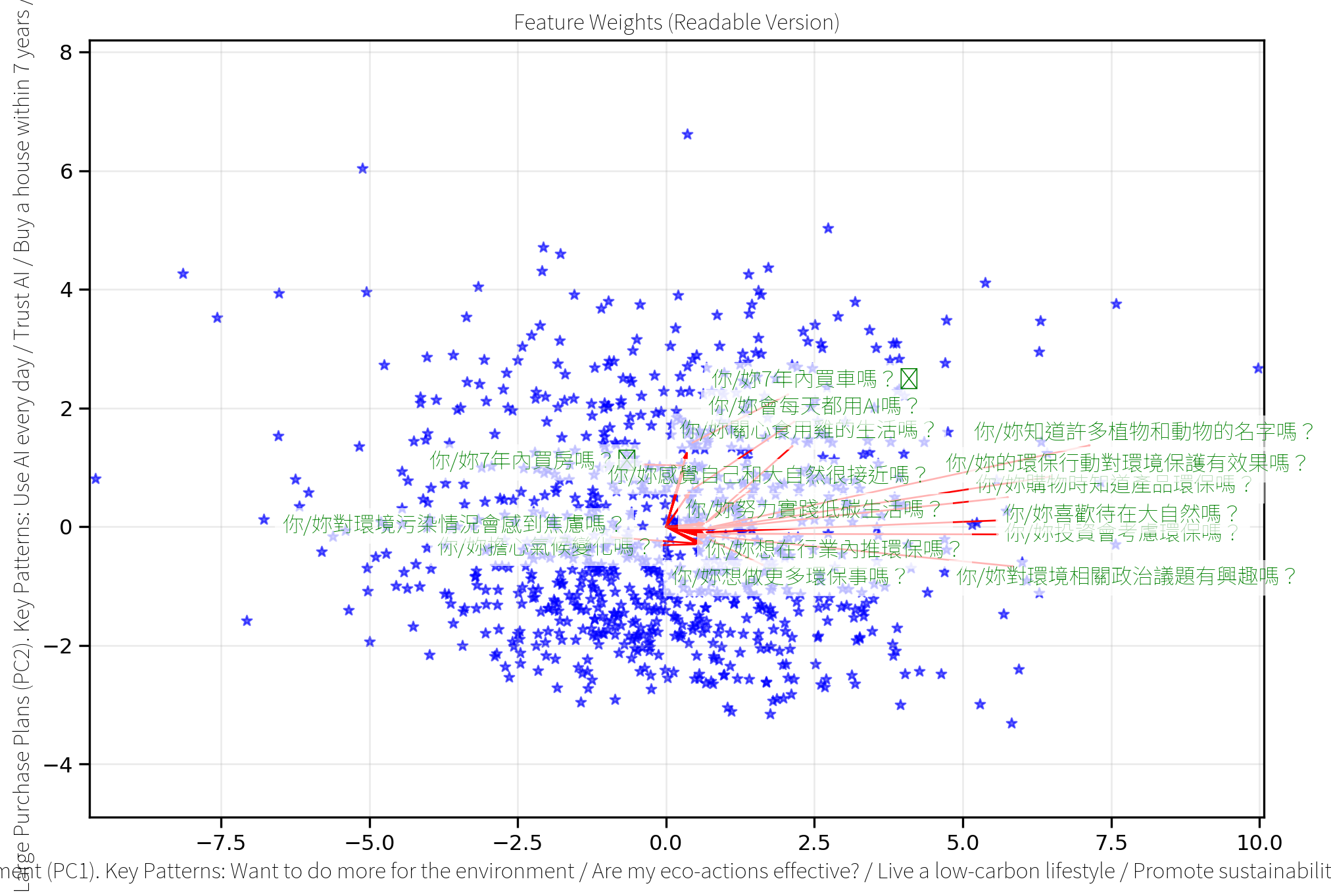
(d)
Figure 2
Persona 2: “Moderate”
Questions Most Affecting Persona Creation include…
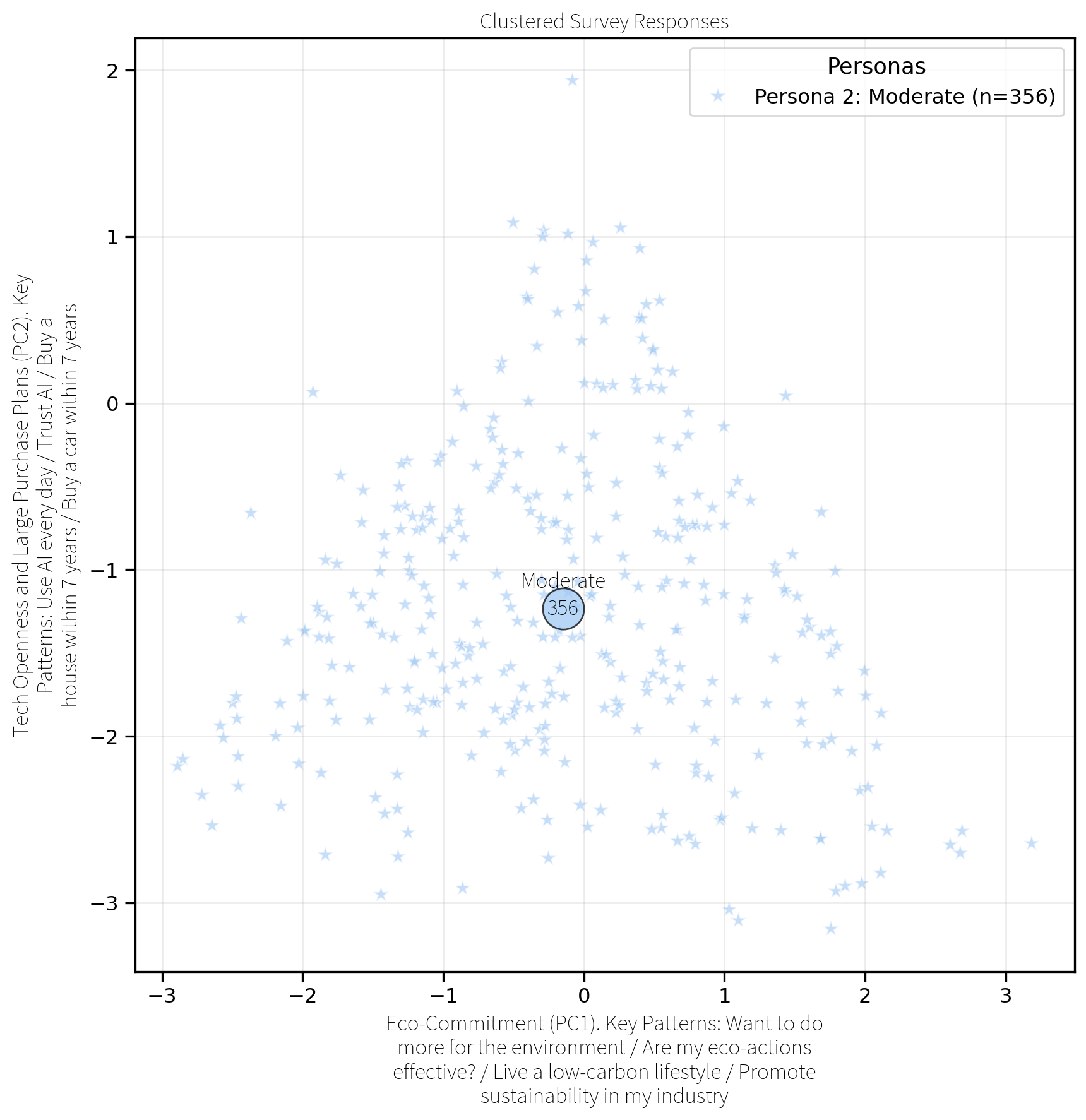
(a) Persona 2 - Moderate
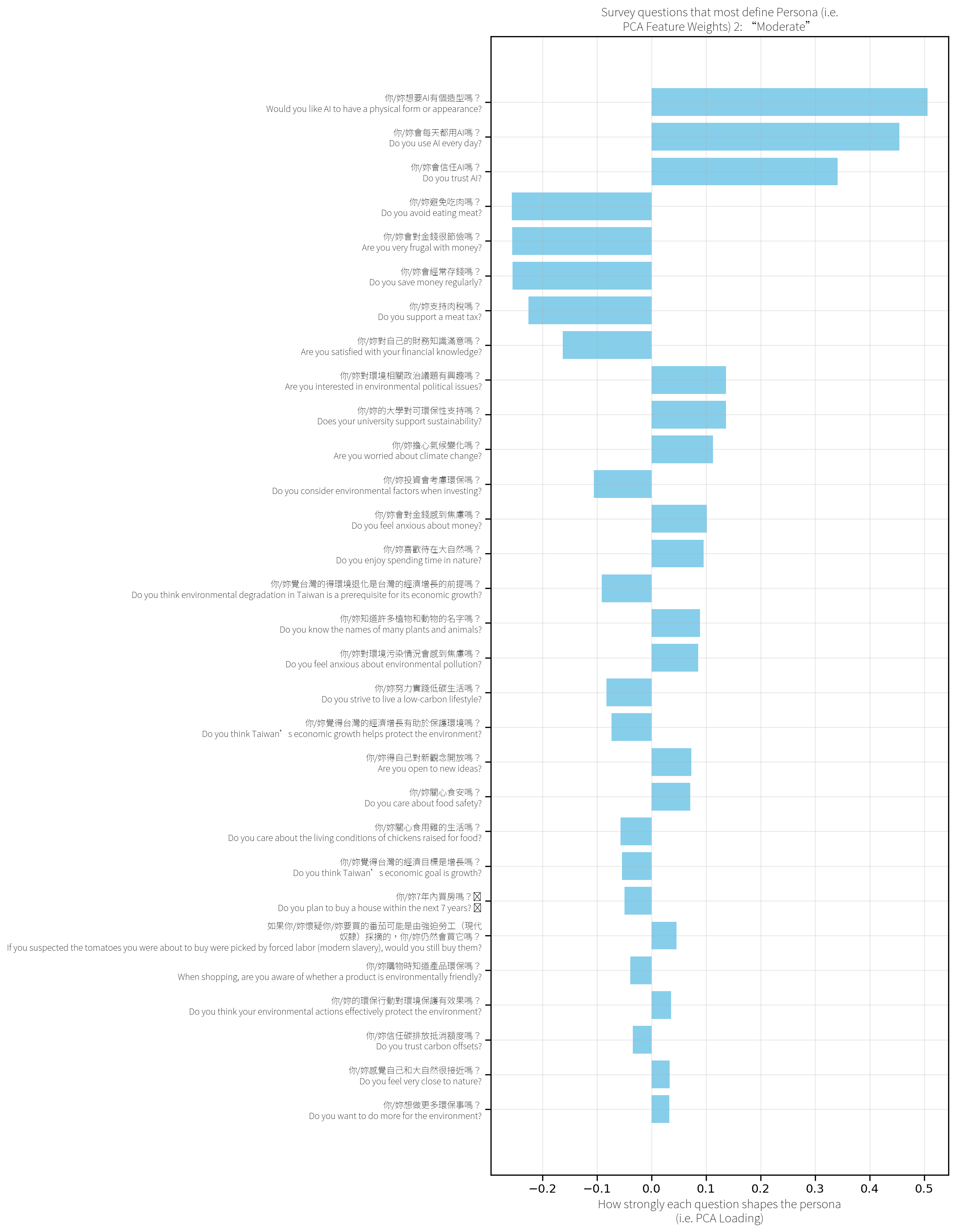
(b)
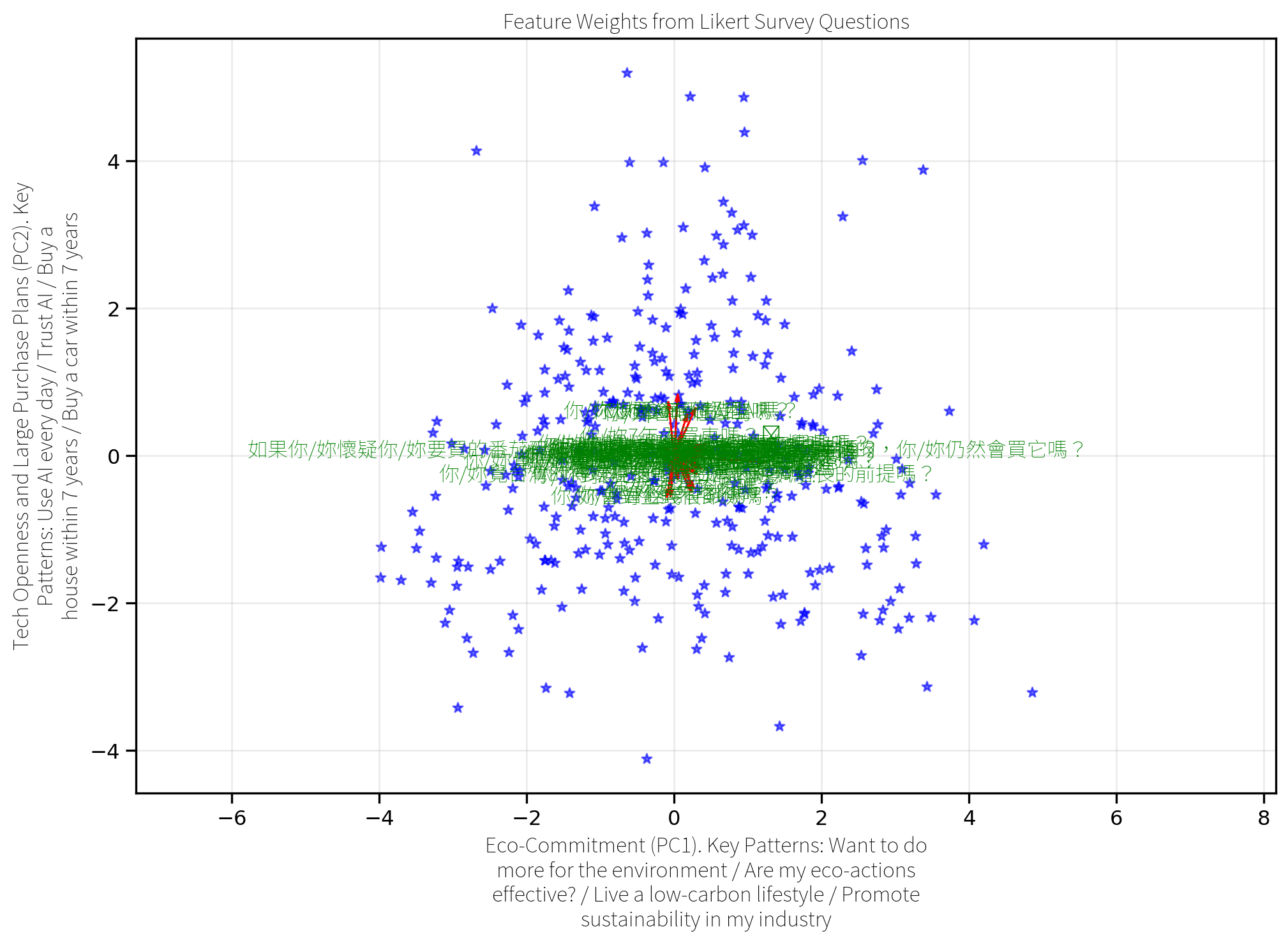
(c)
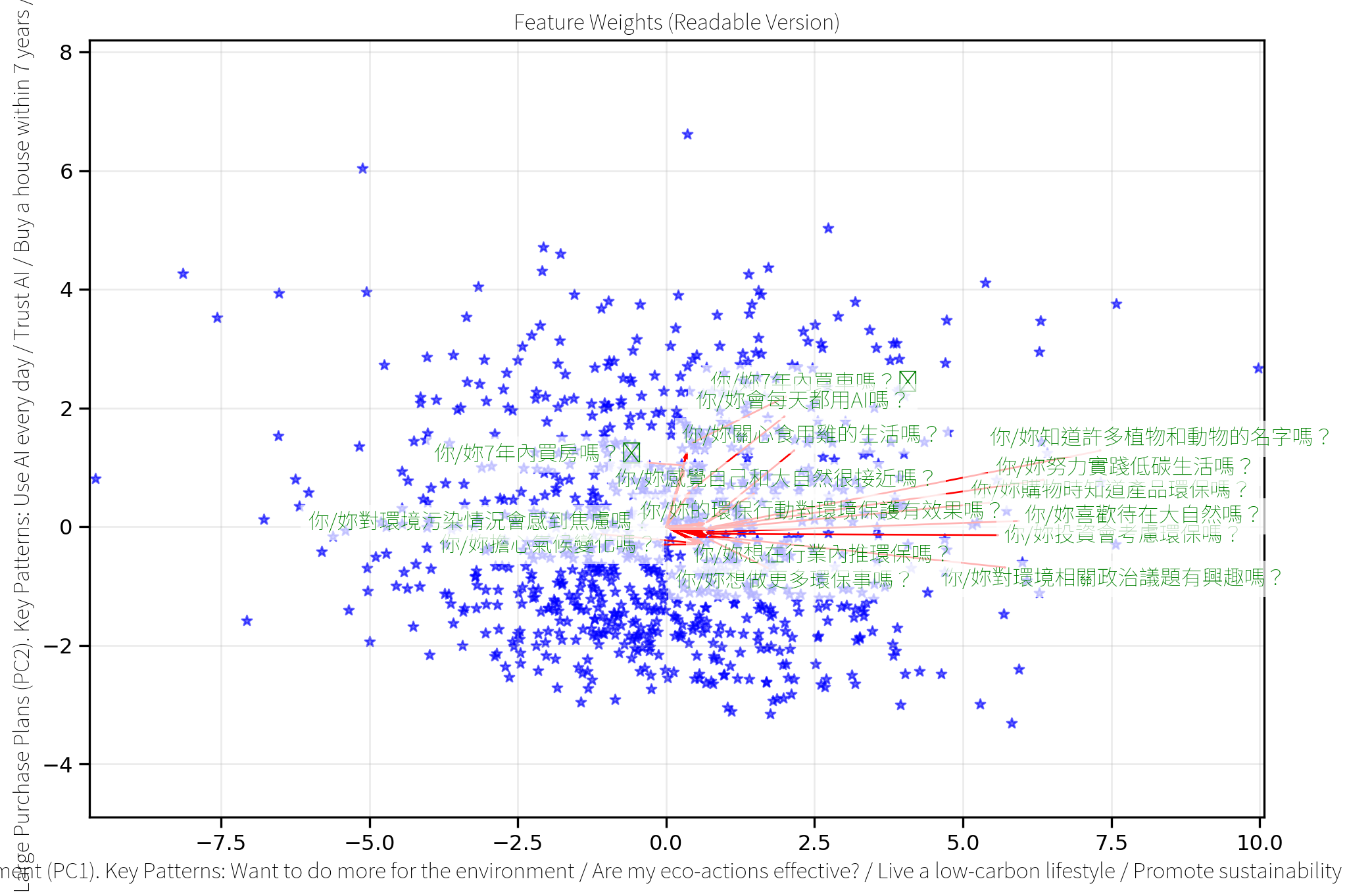
(d)
Figure 3
Persona 3: “Frugal”
Questions Most Affecting Persona Creation include…
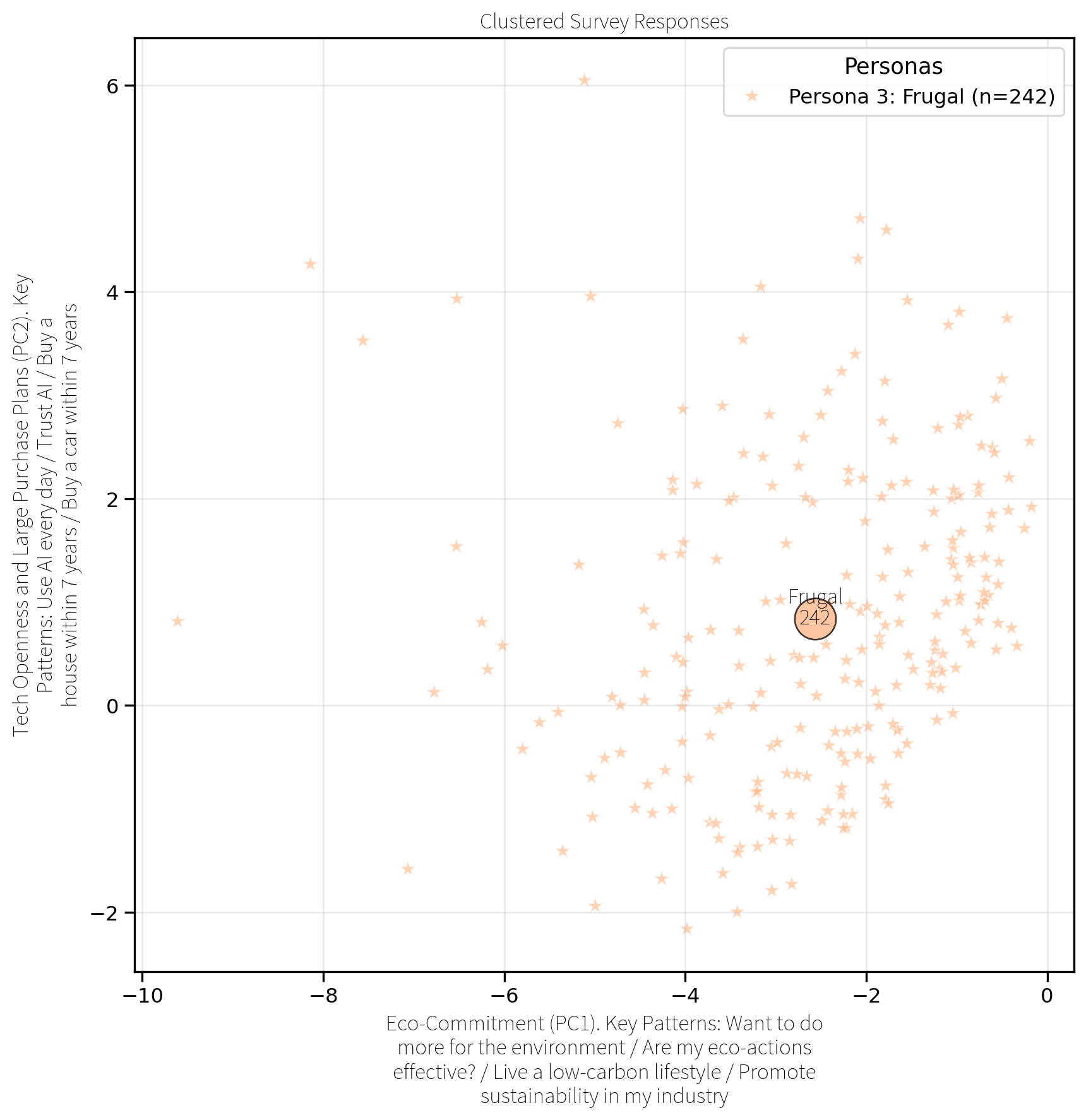
(a) Persona 3 - Frugal
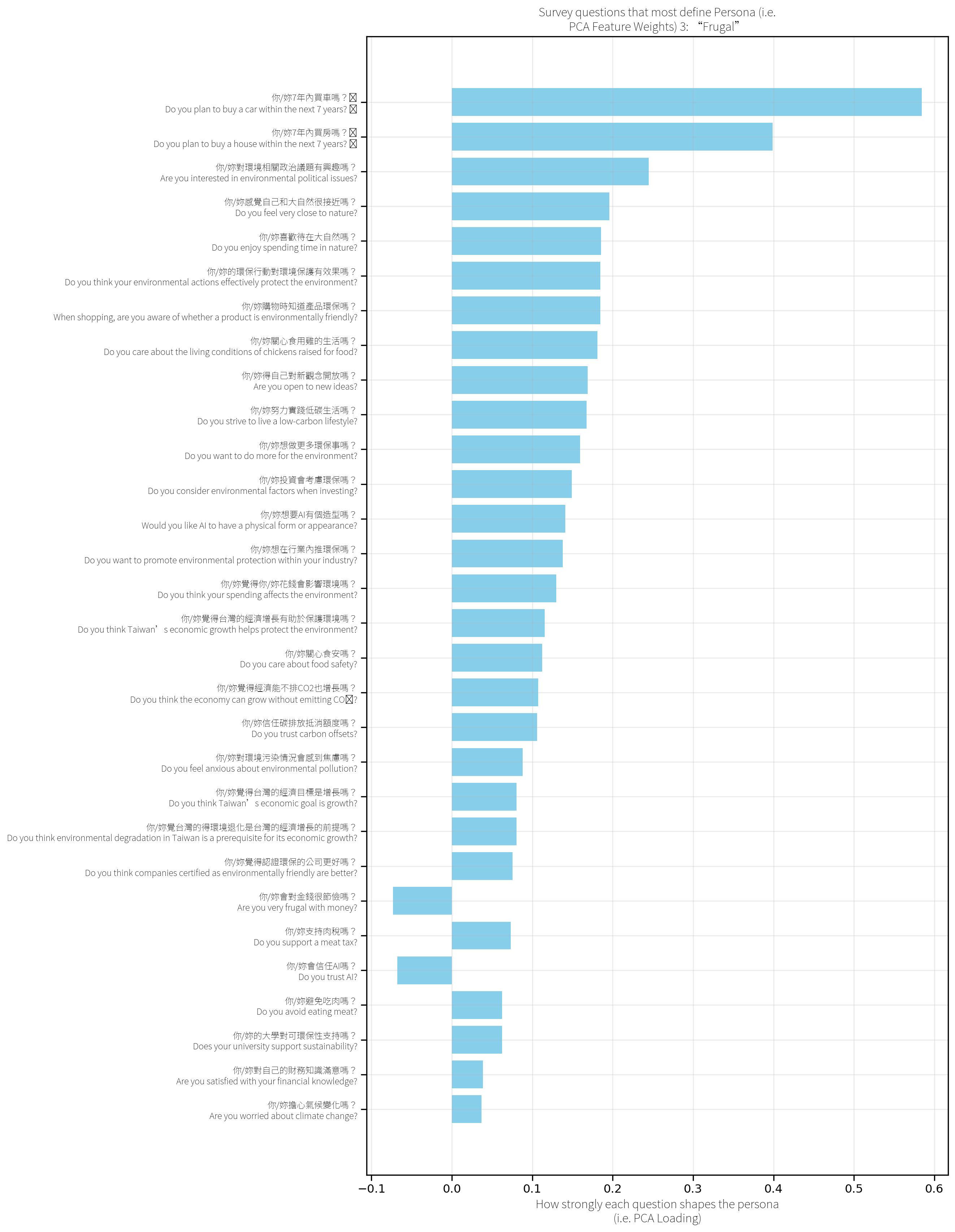
(b)
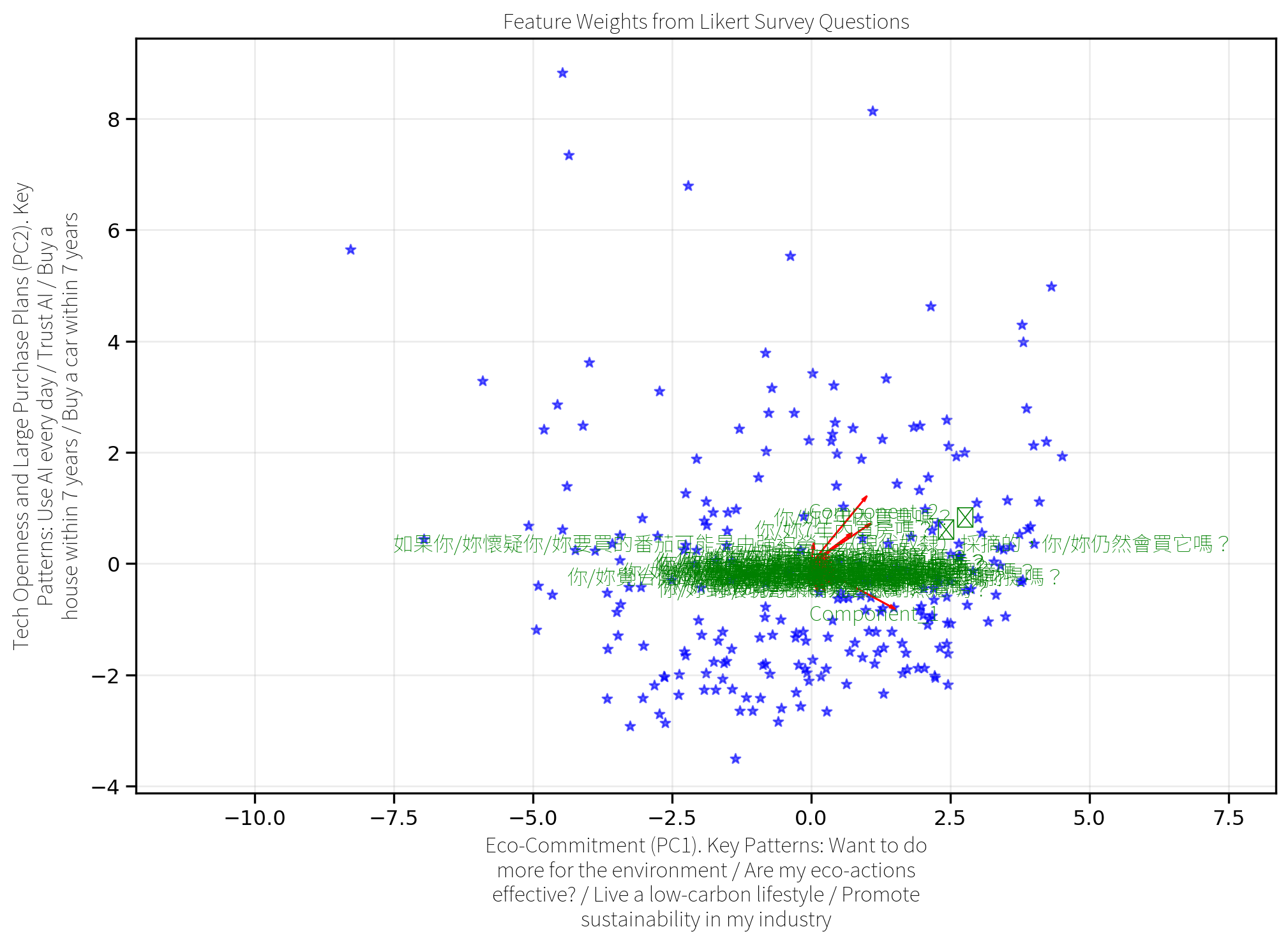
(c)
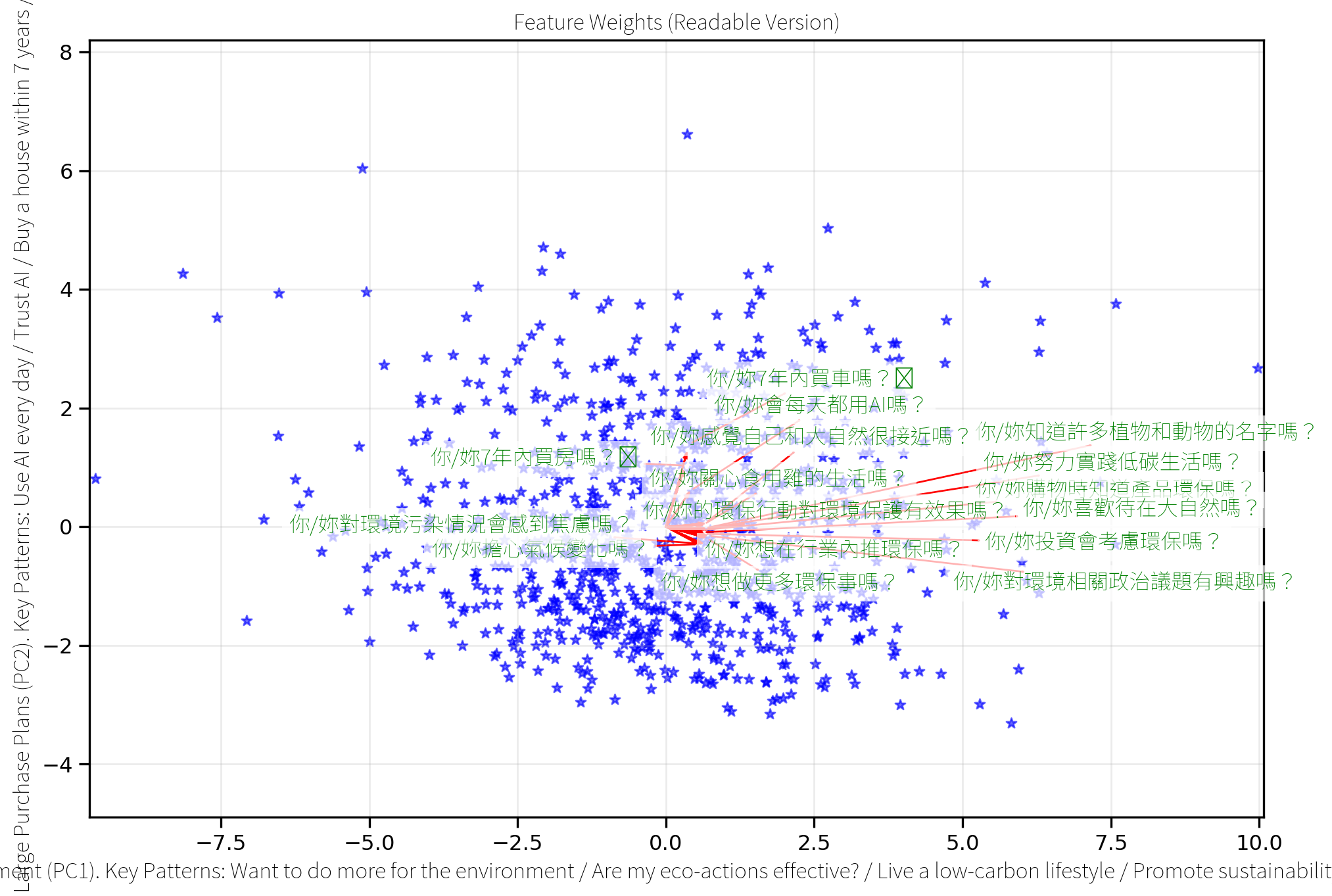
(d)
Figure 4
Clustering Heatmap
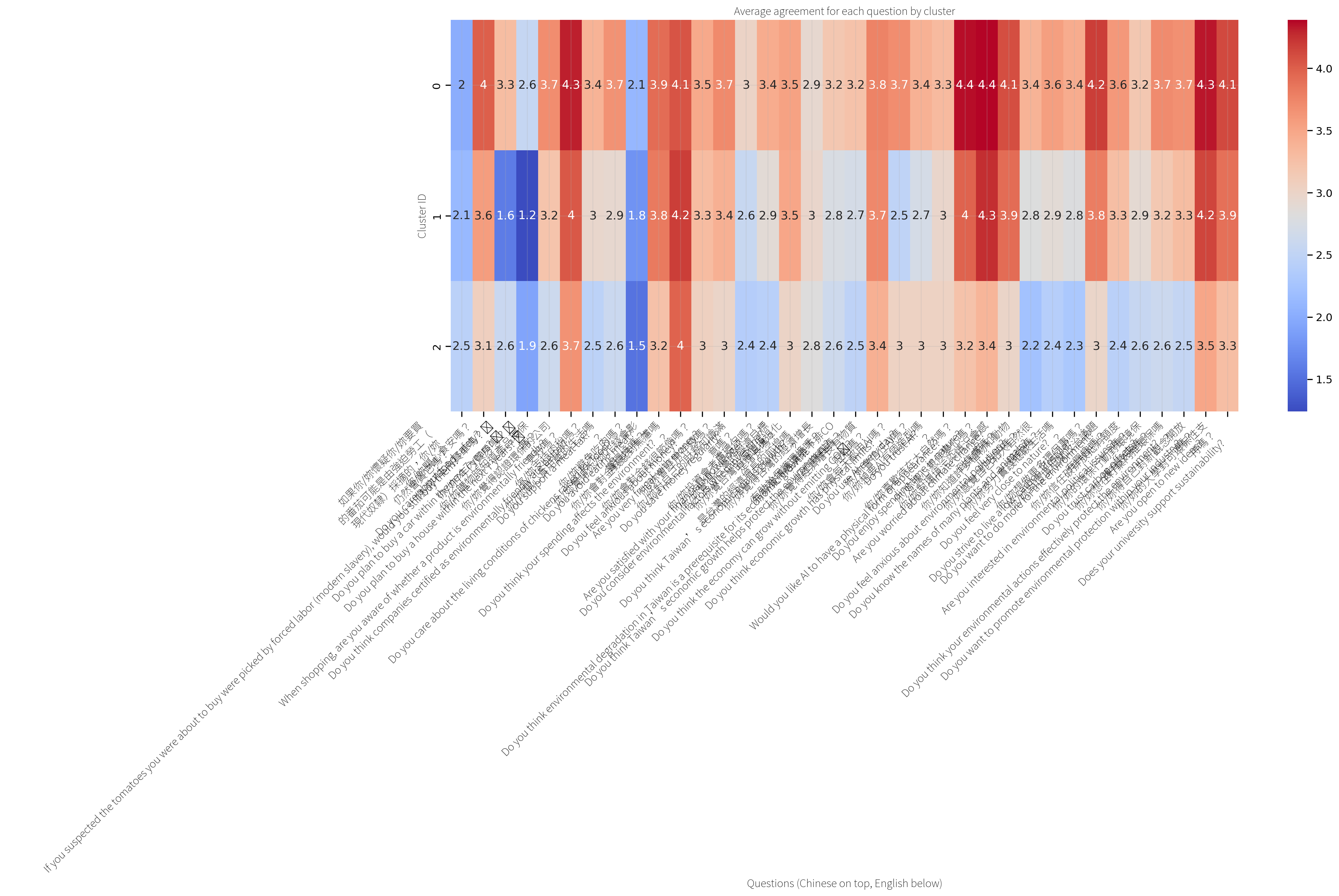
Figure 5: College Students’ Clustering Heatmap
Mean Answer Scores
Mean response values for each Likert question in each cluster:
| Cluster | 如果你/妳懷疑你/妳要買的番茄可能是由強 迫勞工(現代奴隸)採摘的,你/妳仍然會買 它嗎? If you suspected the tomatoes you were about to buy were picked by forced labor (modern slavery), would you still buy them? | 你/妳關心食安嗎? Do you care about food safety? | 你/妳7年內買車嗎?🚘 Do you plan to buy a car within the next 7 years? 🚘 | 你/妳7年內買房嗎?🏡 Do you plan to buy a house within the next 7 years? 🏡 | 你/妳購物時知道產品環保嗎? When shopping, are you aware of whether a product is environmentally friendly? | 你/妳覺得認證環保的公司更好嗎? Do you think companies certified as environmentally friendly are better? | 你/妳支持肉稅嗎? Do you support a meat tax? | 你/妳關心食用雞的生活嗎? Do you care about the living conditions of chickens raised for food? | 你/妳避免吃肉嗎? Do you avoid eating meat? | 你/妳覺得你/妳花錢會影響環境嗎? Do you think your spending affects the environment? | 你/妳會對金錢感到焦慮嗎? Do you feel anxious about money? | 你/妳會對金錢很節儉嗎? Are you very frugal with money? | 你/妳會經常存錢嗎? Do you save money regularly? | 你/妳對自己的財務知識滿意嗎? Are you satisfied with your financial knowledge? | 你/妳投資會考慮環保嗎? Do you consider environmental factors when investing? | 你/妳覺得台灣的經濟目標是增長嗎? Do you think Taiwan’s economic goal is growth? | 你/妳覺台灣的得環境退化是台灣的經濟增長 的前提嗎? Do you think environmental degradation in Taiwan is a prerequisite for its economic growth? | 你/妳覺得台灣的經濟增長有助於保護環境嗎 ? Do you think Taiwan’s economic growth helps protect the environment? | 你/妳覺得經濟能不排CO2也增長嗎? Do you think the economy can grow without emitting CO₂? | 你/妳覺得經濟增長有物質限制嗎? Do you think economic growth has physical limits? | 你/妳會每天都用AI嗎? Do you use AI every day? | 你/妳會信任AI嗎? Do you trust AI? | 你/妳想要AI有個造型嗎? Would you like AI to have a physical form or appearance? | 你/妳喜歡待在大自然嗎? Do you enjoy spending time in nature? | 你/妳擔心氣候變化嗎? Are you worried about climate change? | 你/妳對環境污染情況會感到焦慮嗎? Do you feel anxious about environmental pollution? | 你/妳知道許多植物和動物的名字嗎? Do you know the names of many plants and animals? | 你/妳感覺自己和大自然很接近嗎? Do you feel very close to nature? | 你/妳努力實踐低碳生活嗎? Do you strive to live a low-carbon lifestyle? | 你/妳想做更多環保事嗎? Do you want to do more for the environment? | 你/妳對環境相關政治議題有興趣嗎? Are you interested in environmental political issues? | 你/妳信任碳排放抵消額度嗎? Do you trust carbon offsets? | 你/妳的環保行動對環境保護有效果嗎? Do you think your environmental actions effectively protect the environment? | 你/妳想在行業內推環保嗎? Do you want to promote environmental protection within your industry? | 你/妳得自己對新觀念開放嗎? Are you open to new ideas? | 你/妳的大學對可環保性支持嗎? Does your university support sustainability? | |
|---|---|---|---|---|---|---|---|---|---|---|---|---|---|---|---|---|---|---|---|---|---|---|---|---|---|---|---|---|---|---|---|---|---|---|---|---|---|
| 0 | 0.00 | 2.01 | 4.00 | 3.29 | 2.55 | 3.69 | 4.31 | 3.38 | 3.65 | 2.11 | 3.91 | 4.07 | 3.47 | 3.72 | 3.00 | 3.44 | 3.54 | 2.93 | 3.18 | 3.23 | 3.77 | 3.69 | 3.40 | 3.31 | 4.36 | 4.39 | 4.10 | 3.39 | 3.56 | 3.45 | 4.19 | 3.61 | 3.18 | 3.71 | 3.67 | 4.33 | 4.13 |
| 1 | 1.00 | 2.14 | 3.57 | 1.59 | 1.24 | 3.22 | 4.04 | 2.96 | 2.93 | 1.78 | 3.83 | 4.19 | 3.30 | 3.41 | 2.58 | 2.88 | 3.50 | 2.96 | 2.76 | 2.71 | 3.74 | 2.49 | 2.71 | 2.97 | 3.98 | 4.26 | 3.92 | 2.81 | 2.88 | 2.79 | 3.81 | 3.28 | 2.91 | 3.16 | 3.28 | 4.15 | 3.89 |
| 2 | 2.00 | 2.45 | 3.07 | 2.58 | 1.93 | 2.63 | 3.66 | 2.46 | 2.60 | 1.53 | 3.24 | 3.98 | 3.05 | 3.00 | 2.39 | 2.43 | 3.01 | 2.82 | 2.64 | 2.48 | 3.41 | 3.03 | 3.03 | 3.02 | 3.22 | 3.36 | 2.99 | 2.24 | 2.41 | 2.31 | 2.98 | 2.44 | 2.56 | 2.61 | 2.54 | 3.50 | 3.28 |
Figure 6: Mean Values of Survey Responses
Agreement Between Personas
There is some similarity between clusters. All 3 personas report a high level of financial anxiety and below-average satisfaction with their financial literacy. Highest agreement between personas is about health, safety, pollution and climate concerns.
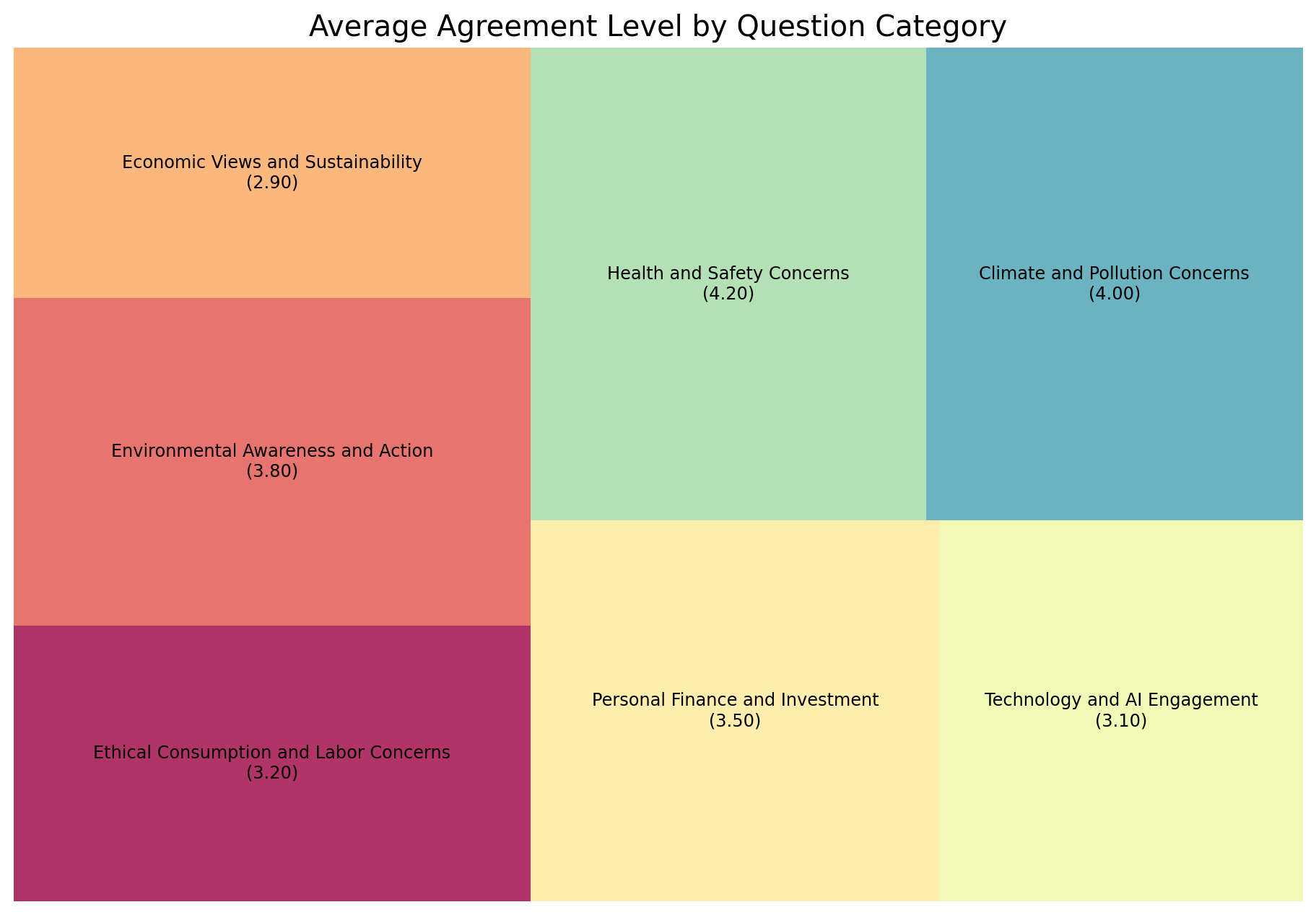
Figure 7: Topics With Highest Agreement Between Personas
| Rank | Category (Mean¹) | Why the take mostly holds | Any nuance to note |
|---|---|---|---|
| 1 | Health & Safety (4.20) | Highest average → students actively click with personal well-being. | The spread is tight; nearly everyone agrees, so messaging can be broad. |
| 2 | Climate & Pollution (4.00) | Strong support for big-picture environmental stakes. | Scores cluster a hair lower than #1, but difference isn’t huge. |
| 3 | Env. Awareness & Action (3.80) | They like the idea of acting green, just slightly less pumped than broad “save the planet” statements. | Some questions in this bucket may have asked for concrete effort (reuse cups, etc.), which drags the mean a bit. |
| 4 | Personal Finance & Investment (3.50) | Mid-3s says “interested, not obsessed.” Your “money talk sits mid-tier” line is spot-on. | Variance is wider; a sub-segment rates it high, others shrug. |
| 5 | Ethical Consumption & Labor (3.20) | Agreement exists but lags — real people far away feel abstract. | If you spotlight specific worker stories, expect this score to climb. |
| 6 | Tech & AI Engagement (3.10) | Curiosity tempered by caution, exactly as you wrote. | The topic is newer, so opinions are still forming. |
| 7 | Economic Growth vs Sustainability (2.90) | Lowest mean = hardest sell; “trade-off” framing pushes folks to neutral/disagree. | If you rephrase questions to show win-win economics, this block can leap upward. |
In summary, Safety > Planet > Personal Eco-action. Students first protect themselves (food safety, health), then the planet, then think about their habits. Money talk sits mid-tier. Finance topics aren’t ignored (3.5 / 5) but aren’t hype either. Ethical labor & AI still feel abstract. Sweat-shop worries and AI curiosity land in the low-3’s. Economic trade-offs are the hardest sell. When sustainability sounds like “sacrifice growth,” support tanks (< 3).
Design Implications: Frame eco-features around personal health wins to boost engagement. App idea: Link sustainable investing to tangible health or climate outcomes to lift enthusiasm. Communications angle: Storytelling about real human impact behind labor issues and show AI as a practical helper, not sci-fi. Policy framing: Highlight win-win scenarios (green jobs, savings) instead of “growth vs. green” rhetoric.
Notable Quotes from the Survey
The survey also included textual fields where college students could express their ideas in their owns words. Here are some quotes, which show the attitudes and feelings of the students.
| Original Quote (Chinese) | English Translation | Category |
|---|---|---|
| 黑心商品不健康或老闆品德不佳 | “Black-hearted products are unhealthy, and the boss has poor morals.” | Opinionated/Emotional |
| 因為味全以前使用黑心油所以再也不買他們家的產品 | “Because Wei Chuan used gutter oil in the past, I will never buy their products again.” | Emotional |
| 有食安問題、政治立場不同 | “They have food safety issues and [hold] different political stances.” | Thematic (Food safety/Political) |
| 對環境造成破壞或是對人不健康 | “It causes damage to the environment or is unhealthy for people.” | Thematic/Opinionated |
| 公司使用地溝油來製造產品 | “The company uses gutter oil to manufacture its products.” | Thematic (Food safety) |
| 分享心情,提供建議,像是跟朋友聊天,但不用擔心秘密被知道 | “Share feelings and give advice, like chatting with a friend, but without worrying that secrets will be revealed.” | Emotional |
| 一個指令一個動作即可。太厲害的反應會擔心哪一天被反撲取代 | “One command at a time is enough. If its responses become too powerful, I worry it could one day turn against us and replace us.” | Unique perspective / Fearful |
| 支持致力於永續環保的企業,抵制不具環保意識的公司。 | “Support companies committed to sustainability and environmental protection, and boycott those lacking environmental awareness.” | Thematic |
| 很多大學會有產學合作課程,公司在招募人才的時候應該也希望聽到年輕人對現當代行業的想法,所以我認為本來就會有一定的影響! | “Many universities have industry–school cooperation programs. When companies recruit talent, they likely want to hear young people’s ideas about modern industries, so I believe there will inherently be some influence!” | Thematic / Optimistic |
| 老實說影響力可能很有限,不過可能可以透過有前景的提案或是具有經濟價值的行動 | “Honestly, our influence might be very limited, but perhaps we can act through promising proposals or actions with economic value.” | Realistic / Opinion |
| 網路上理性發表意見,影響到社交圈,藉由輿論改變公司方針 | “Post opinions rationally online, influence your social circle, and change company policy through public opinion.” | Thematic (Activism) |
| 戰爭、人們不再相愛、世界末日 | “War, people not loving each other anymore, the end of the world.” | Emotional (Dramatic fear) |
| 核電廠爆掉 | “A nuclear power plant explodes.” | Emotional/Fearful |
| 氣候失控、地緣政治風險 | “Uncontrolled climate and geopolitical risks.” | Thematic (Climate/Politics) |
| 冰山融化,海平面上升 | “Icebergs melting and sea levels rising.” | Thematic (Climate) |
| 小時候爸爸出門都會跟我們說要帶購物袋,並重複利用,就算髒了也可以再拿去當垃圾袋。 | “When I was little, my dad would always tell us to bring our own shopping bags and reuse them; even if they got dirty, we could still use them as trash bags.” | Nostalgic / Moral |
| Podcast:百靈果的每個禮拜的國際新聞與來賓訪談,他們用有趣的方式讓我知道好多好多事 | “Podcast: ‘Bailingguo’ does weekly international news and guest interviews – they let me learn so much in such an interesting way.” | Unique / Memorable |
| 愛因斯坦相對論,特別是在談視界(event horizon),這顯著影響我的哲學思考。 | “Einstein’s theory of relativity, especially discussing event horizons, has significantly influenced my philosophical thinking.” | Intellectual Inspiration |
| 高中老師努力推行環保,跟我們分享台灣的珊瑚礁有多寶貴,然後現在面臨什麼樣的風險。 | “My high school teacher worked hard to promote environmental protection, sharing with us how precious Taiwan’s coral reefs are and what risks they currently face.” | Inspirational/Educational |
| 我認為要人民注重環保的先決條件是經濟狀況,假如一個家庭的經濟收入非常拮据,他們優先考慮的通常不是環保而是吃飽。 | “I think the prerequisite for people to care about the environment is their economic situation. If a family’s income is very tight, their priority is usually not the environment but having enough to eat.” | Thematic (Socioeconomic) |
| 以屏科大為例,它宣揚自己是全國綠色大學第一名,並且發展許多環保或綠色議題的研究,但就細節而言,實際上學生的環保觀念並無太大提升,即便這個環境一直在宣傳環保議題,可是學生餐廳內仍然充斥著許多環保筷、塑膠湯匙等用具。 | “For example, Pingtung University of Science and Technology promotes itself as the country’s top green university and conducts much environmental research. But in detail, students’ environmental awareness hasn’t really improved; even though the campus constantly promotes green issues, the cafeteria is still filled with many disposable chopsticks and plastic spoons.” | Opinionated (Campus vs. Practice) |